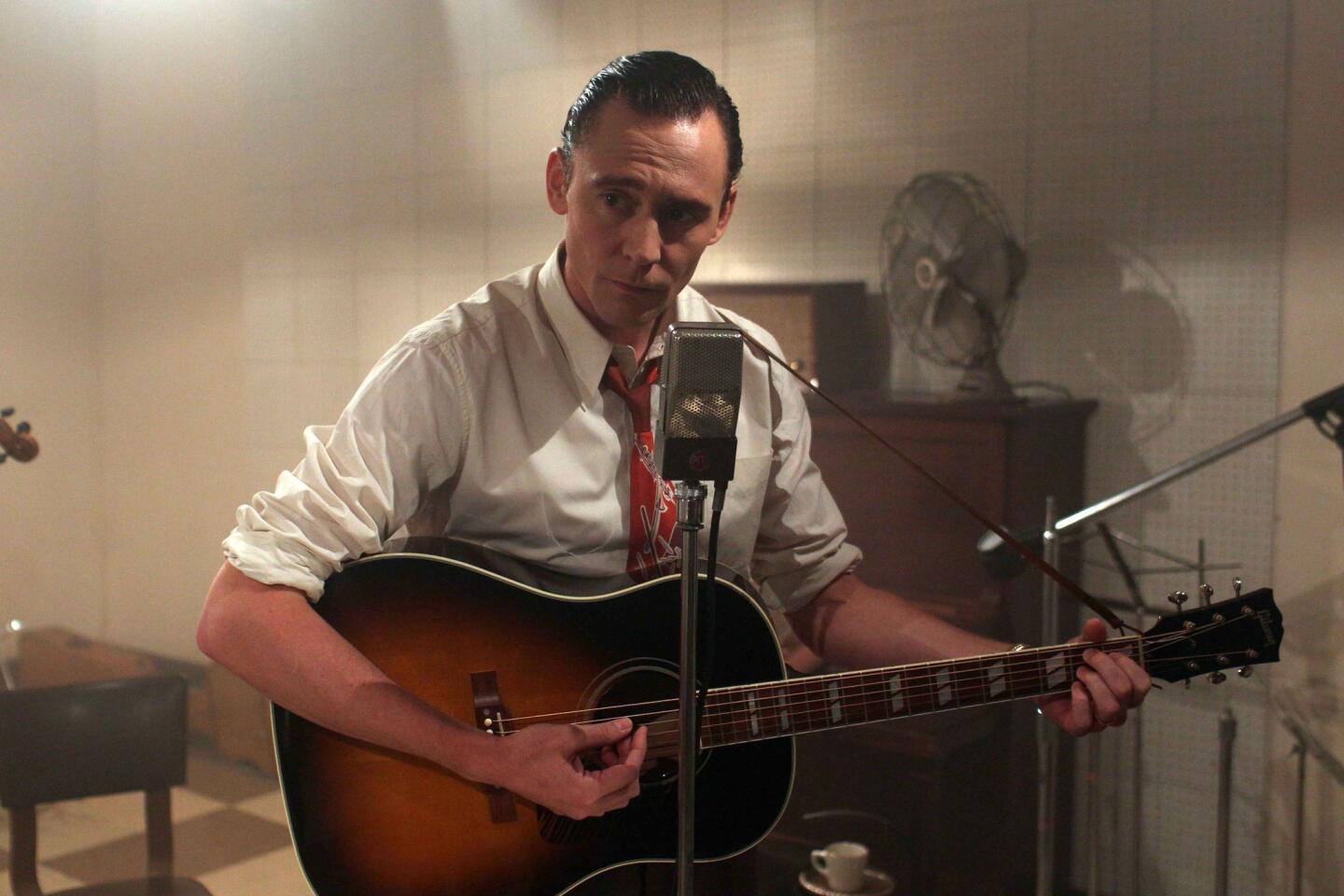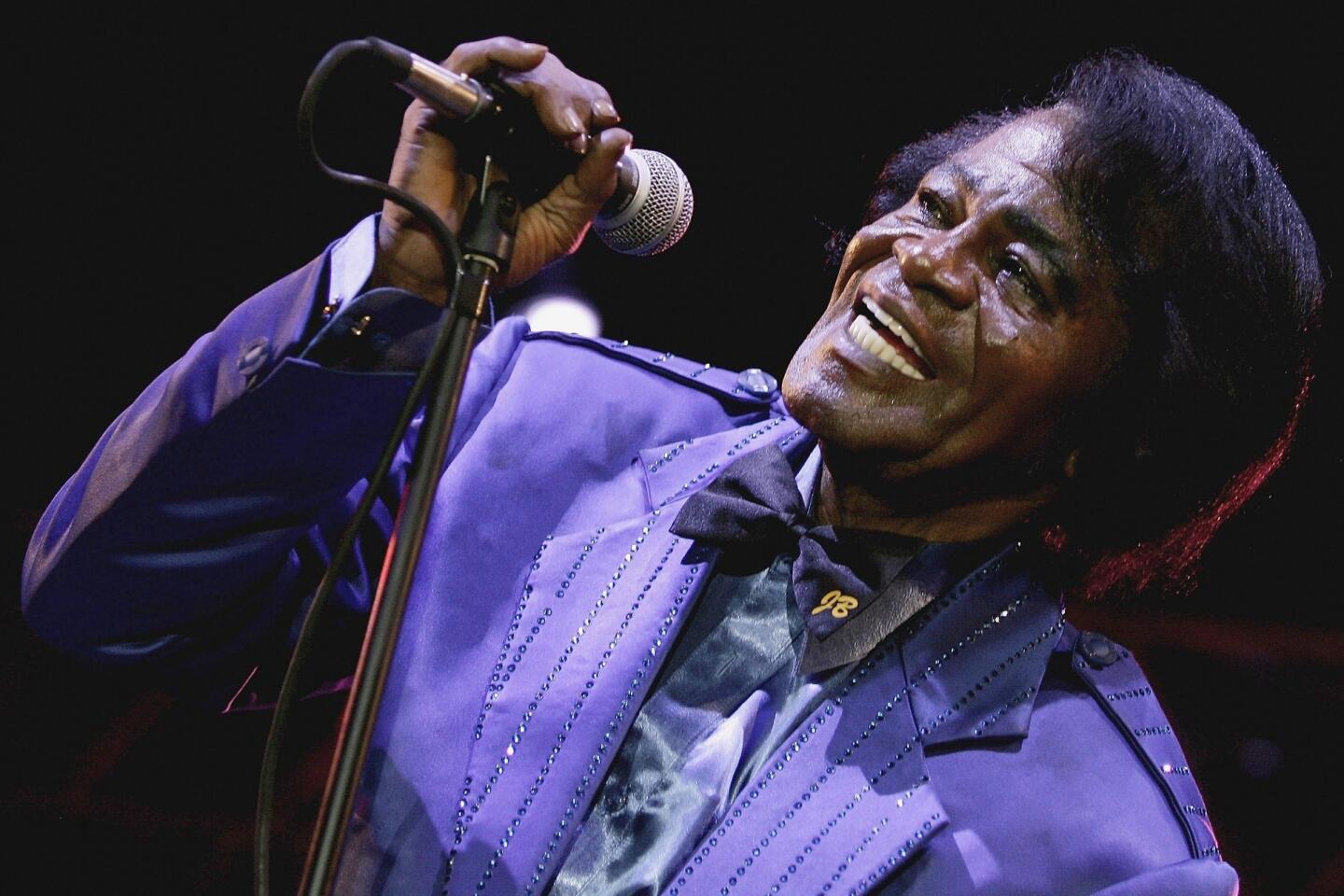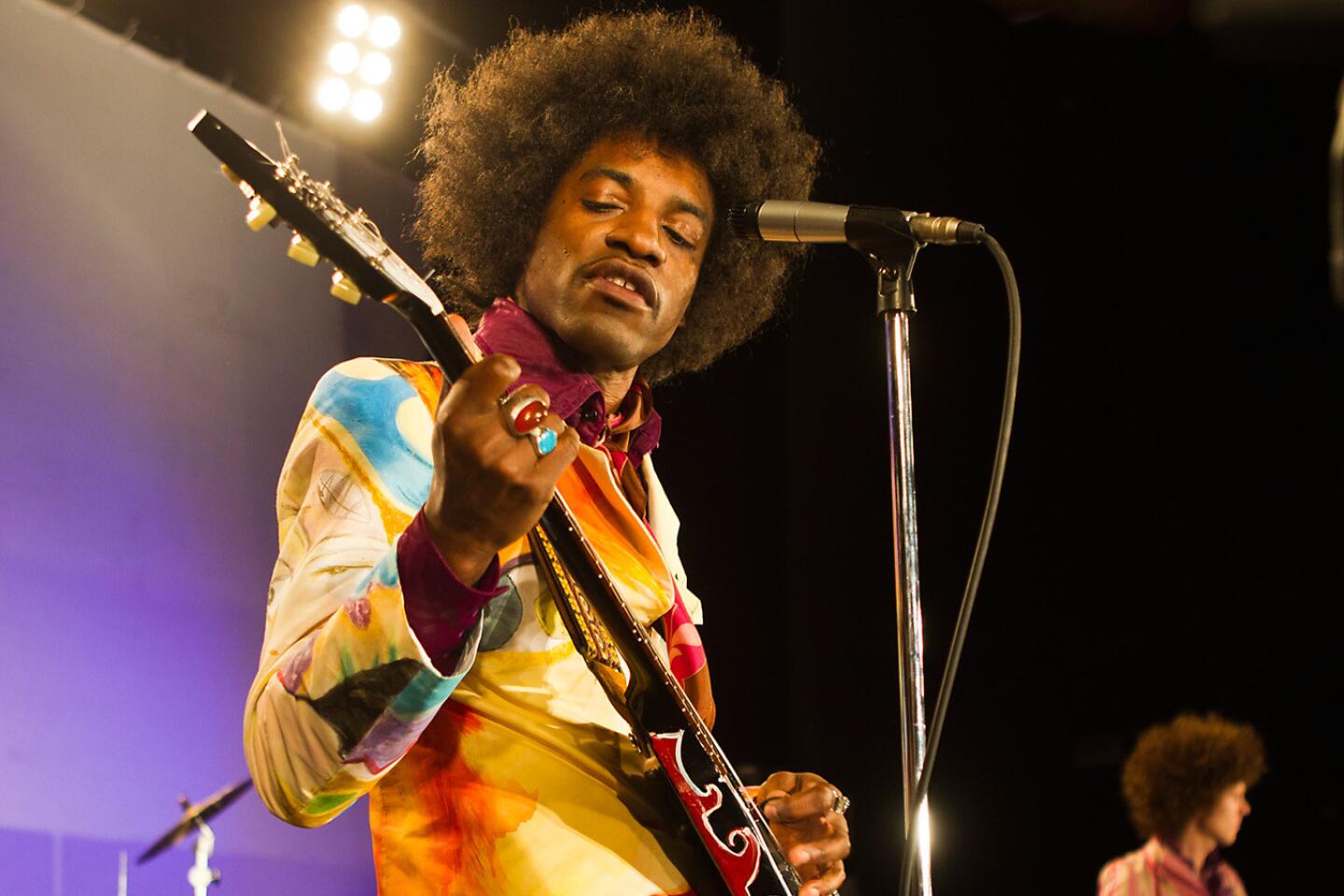As ‘Miss Sharon Jones!’ hits theaters, the soul singer and cancer survivor tours on
- Share via
Reporting from CAMDEN, NJ — Sharon Jones has died of pancreatic cancer at the age of 60. An announcement of her death was made on her official website late Friday (Nov. 18). Read our staff obituary here. What follows is a story we wrote about her life and career following an interview with Jones in August.
The soul singer Sharon Jones, afflicted repeatedly with cancer but prone to vibrating as though possessed by James Brown’s ghost, looked disconcertingly ill.
Just behind a stage where about a dozen musicians from her band the Dap-Kings were sweating and jumping, electrifying an amphitheater crowd on this sweltering Sunday, Jones sat, shaking and shivering. She pulled a hood up over her head, bald from chemotherapy treatments, and seemed to disappear inside herself. She clutched a blanket around her body and asked for some water.
“Where am I?,” the subject of Barbara Kopple’s new documentary “Miss Sharon Jones!” said meekly to an assistant.
“Camden,” the assistant replied, kneeling and taking Jones’ hands in her own. “It’s Philly, but technically it’s Camden. Remember, you flew in this morning?”
Jones barely seemed to register the information. The band kept going as fans of Hall & Oates, which was headlining, filtered into the BB&T Pavilion, a 20,000-seat outdoor venue on the banks of the Delaware River, across from the Philadelphia skyline.
Then, in the manner of some newly hatched alien species, Jones started to slowly stretch her arms. She unfolded herself from her low chair and stood up. Her mouth moved in a series of low-rumble vocal exercises. She began walking in a circle and, a moment later, when a band member called her name to introduce her, she bounded out from behind the stage to take the microphone.
Within a minute, Jones’ silver shoes had flown off as she bounced in ecstatic rhythm, her mouth — her whole body — inhabiting her style of hot soul.
“I don’t know how many of you know me,” she said to the audience between songs, using a preacherly cadence. “But I’m battling. No matter how much pain I’m in I can always sing. This has been hell I’m going through.”
The crowd, whose size was growing as the set moved along, began to clap along. “I say to the cancer, get up and get out. GET. UP. AND. GET. OUT.”
Gospel beginnings
At 60, Sharon Jones has lived a lot of lives. She says that does not deter her from living a few more.
Born into poverty in North Augusta, S.C., near the Georgia border (not far from Brown’s birthplace), Jones always had a powerful voice. She deployed it in church gospel groups, but not really anyplace else. As the Oscar-winning Kopple describes in her film (released in L.A. this weekend, it focuses on the singer’s’ first bout with cancer, in 2013), Jones was overlooked by the music industry. I was “too dark and too short,” she likes to say, with characteristic candor and what might be described as an endearing orneriness.
Instead, the singer spent years working as a guard at Rikers Island prison or for a Wells Fargo armored car, performing mainly at her gospel church. (Jones spent decades living in Brooklyn but has recently returned to the area where she grew up.)
Twenty years ago, Jones caught a break via a stint backing up the funk performer Lee Fields. She nabbed the attention of Gabriel Roth, a Riverside native who, at the time, lived in New York and was the leader of several horns-heavy retro-soul outfits. Soon he had formed the Dap-Kings, drawing from past collaborators and centering it on Jones. She and Roth have been making music ever since.
Their work has been critically acclaimed if hardly chart-topping — throwback ’70s soul and funk is self-evidently out of fashion in this auto-tuning, super-producing era. But thanks to Jones and Roth — along with backup singers the Dapettes and a host of talented brass and percussion instrumentalists — the albums began to earn them a niche following.
In 2007 came “100 Days, 100 Nights,” with its breakout title song. And then, in 2010, the band put out another acclaimed record, “I Learned the Hard Way,” which featured “Better Things,” a track whose catchy piano riff undergirds a forward-facing message (“I’m a better woman than I have been/Because I don’t think of things way back when”).
Mainstream acceptance, of a sort, finally arrived in 2014, when she and the Dap-Kings put out “Give the People What They Want” and were nominated for a Grammy for R&B album. (“They gave it to Babyface and Toni Braxton. When did they put out an album? And is that soul? They need a separate category for soul. Bring back soul.”)
But sales remained modest. Touring, instead, has been a staple. Jones has been out on the road a lot lately, including a gig in Memphis the night before the Camden set that had her on a 5 a.m. flight into Philadelphia. The current tour will stretch across the U.S., coming to the Hollywood Bowl in September and culminating in Las Vegas.
This marathon is happening even as her cancer, which is centered in her pancreas, returned last year — she announced the news at the Toronto International Film Festival, after the premiere of “Miss Sharon Jones!” Rather than sit and convalesce, as she can be seen doing for chunks of the film, she decided to fight through.
That decision requires some tricky maneuvering: Doctors rescheduled chemo so Jones wouldn’t receive treatment in this two-week run of shows, for instance. And a European leg was canceled due to an unexpected medical procedure. But Jones has been steadfast.
“Last time she said she wouldn’t tour. She took a different route this time,” said Alex Kadvan, Jones’ longtime manager, with a kind of expression that said he long ago learned not to question, or underestimate, his client.
She lives for the stage
On this day she was feeling the effects of a recent blood transfusion. As she sat in her dressing room before the show, she ran through her medical issues, then said they didn’t matter.
“I don’t want to get on stage when I can’t move around. But as long as I got my heart and my strength, I’m going to get out there. The adrenaline gets you going and it all goes away.”
She reflected on time lost, and time left.
“I started late, and I suppose I only got a few more years. So I want to get it in while I can, before I go away from here,” she said, using a favored expression for her mortality.
Jones, who is not married and has no children, said she needs to begin thinking about wills and estate planning. She expresses this thought with the kind of matter-of-fact-ness that can come from staring down cancer for several years.
She does have a somewhat pessimistic view on art and fame. “I really would like to sell millions of records. I don’t know why I haven’t,” she said.
She noted that she does not feel she achieved professional happiness.
Asked, then, what would supply that, she paused. “You know when I would have been happy?” she said. “If I had won that Grammy. It would have been, ‘She won that Grammy, and now she’s gone.’ That would have made me happy.”
For all her rueful talk, though, her on-stage persona remains unbowed. “If you look around during a set and have to say which one of us is going through cancer, she’s the last one you’d guess,” Roth said. “This is her therapy. She doesn’t want to sit at home and feel sorry for herself. This is how she feels better — feeding off the crowd.”
Kopple, who is known for music-themed docs (“Wild Man Blues,” about Woody Allen’s jazz tour, and the Dixie Chicks-centered “Shut Up & Sing”), said Jones is motivated by another dynamic. “She doesn’t like to be left out, especially with the band.You can see it in all these ways — ‘Don’t forget about me; don’t forget to include me.’”
At the show, that sense of belonging spread to the crowd. At the start of the set, many concertgoers were still streaming in, halfheartedly paying attention in the manner of crowds at an opening act, chatting as they clutched plastic cups of beer. But as the spontaneous set progressed (the Dap-Kings use no set lists, instead following Jones and Roth wherever they want to go) the crowd began to take notice.
The band ran through some of the their go-to numbers, including “100 Days,” a cover of Gladys Knight’s “Every Beat of My Heart” and “Get Up and Get Out,” also the title of a song. Jones torqued and twisted in a red dress, a funkified fireball very much in her element. Jones’ voice manages to be robust and wide-ranging at the same time that it’s sensitive and flecked with emotion, and the audience responded.
By the time the set was over, she had won over scores of new fans, who had joined the old ones in coming to their feet with loud applause.
Jones then stepped backstage, an expression of childlike enthusiasm adorning her face, and sat down to a post-show meal with band members. She talked about the quality of the show and, occasionally, the state of her digestion.
A staffer walked into the room. “Someone wants to meet you,” the employee said to Jones.
“Who is it?” the singer said warily.
“It’s Chubby Checker,” came the response.
Jones sprang out from her seat and practically sprinted out of the room. “You’re going to knock us over,” laughed Starr Duncan, one of the Dapettes.
In the hall, Jones posed for a selfie with Checker, who had been spending some time with Hall & Oates. Jones looked delighted. “This is great,” she said. “Chubby Checker!”
Then a moment later, she added, “But it would still be nice to win a Grammy and sell a million records, before I go away from here.”
More to Read
Only good movies
Get the Indie Focus newsletter, Mark Olsen's weekly guide to the world of cinema.
You may occasionally receive promotional content from the Los Angeles Times.














